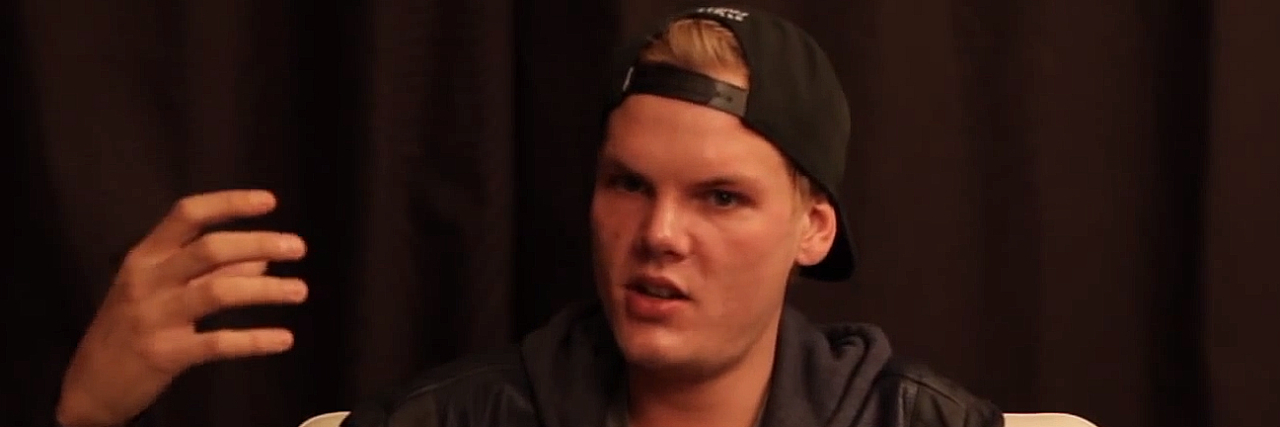Here's What We Should Be Sharing Instead of the Latest Details About Avicii's Suicide
Sometimes the news isn’t as straightforward as it’s made to seem. Sarah Schuster, The Mighty’s mental health editor, explains what to keep in mind if you see this topic or similar stories in your newsfeed. This is The Mighty Takeaway.
Editor's Note
If you experience suicidal thoughts or have lost someone to suicide, the following post could be potentially triggering. You can contact the Crisis Text Line by texting “START” to 741741.
Swedish EDM DJ Avicii, whose real name is Tim Bergling, died on April 20 at the age of 28. After his family released a statement alluding he was struggling with his mental health, many assumed the popular DJ had died by suicide.
On Tuesday, TMZ confirmed this — but in the most graphic and disrespectful way possible.
There’s nothing wrong with identifying someone’s death as a suicide. In fact, when someone dies by suicide, it’s often an opportunity to make the topic less taboo and shameful. Talking about suicide will not make someone more suicidal, and talking about it openly and without shame can be a great way to reach people who are struggling.
But TMZ did not confirm Avicii’s death was a suicide to spread awareness about suicide prevention. On the contrary, as it has done time and time again, TMZ dug for and then published graphic details about how a person died by suicide. This goes against responsible reporting guidelines for suicide and can be harmful to those who’ve lost someone to suicide. It’s exploitative and sensationalizes suicide loss — tempting someone to click in for the “gory details” instead of encouraging them to think about the person behind the suicide. The person who struggled. The person who deserves our respect.
Instead of supporting TMZ and other sites who are writing up their coverage, here are some things you can do.
1. Don’t give sites like TMZ your clicks — instead, provide support resources for people who are suicidal.
If you want to be respectful of the person who has passed and their family and friends, step in front of your curiosity. Your click on that page is your vote. Your click tells them that you want more articles like these. Your click pays them for violating privacy & grieving space https://t.co/x28ZVEQzXH
— Anna Shinoda (@AnnaShinoda) May 1, 2018
TMZ will continue to write stories including suicide methods as long as these stories keep generating traffic. As Anna Shinoda, wife of Linkin Park frontman Mike Shinoda, who lost bandmate Chester Bennington to suicide last July, posted on Twitter, “Your click on that page is your vote. Your click tells them that you want more articles like these. Your click pays them for violating privacy & grieving space.”
Don’t click on articles that report on suicide methods for the sake of generating traffic. Click on these pages instead:
- We Can All Prevent Suicide via the National Suicide Prevention Lifeline
- Risk Factors and Warning Signs of Suicide via the American Foundation for Suicide Prevention
- Preventing Suicide via The Trevor Project
- Why You Shouldn’t Say Committed Suicide via The Mighty
2. Support people who are sharing their own mental health stories in response to Avicii’s death.
While gossip sites like TMZ will use Avicii’s death to spread the “juicy” details, there are other stories being told that deserve our attention. For example, American DJ Kaskade posted a blog about depression and anxiety following the news of Avicii’s death. He said Avicii’s death had prompted him to talk to other DJ’s, producers and people in the music industry about mental health, and wrote:
I don’t have a cure for depression, anxiety and the ills of the world. But if my thoughts of Tim over the last few days have led me anywhere, it’s to this place: fight like crazy for the things that restore balance. Help others in their fight. I salute those who have persevered in their struggle to stay in this world, I know it is exhausting. I am so extremely sad for those who have lost that fight. I won’t let this sadness go unanswered, though. I commit to keep my eyes open and to give love, kindness and compassion to those who need it, including myself.
Every day, brave people talk their own experiences with depression, anxiety and suicidal ideation. These personal experiences and encouraging words need to be the norm of suicide coverage — not sensationalistic headlines that put method before people or gossip before respect.
3. Stay connected to people in your life who are struggling.
When people who die by suicide are reduced to their methods, it’s easy to forget about the human behind the struggle. The reality is, you or someone who know may be able to emphasize with Avicii’s pain, and when someone so high-profile dies by suicide, we need to be there for each other.
Check in with a friend you know is going through a rough time. If the news has affected you personally, make sure your support system knows how you’re doing and take extra care of yourself. Never forget there is help for people who are feeling suicidal, and that you can call the National Suicide Prevention Lifeline at 1-800-273-8255 or text “START” to 741-741.
If you’re not sure how to support a friend who’s struggling, here are some pieces that might help:
Image via Wikimedia Commons/GlobalGrindTV

